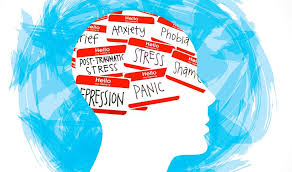Mental Health Matters: Strategies for Managing Stress and Anxiety
In today's fast-paced world, stress and anxiety are common experiences. Work deadlines, financial pressures, and relationship challenges can all contribute to these feelings. While some stress can be motivating, chronic stress and overwhelming anxiety can significantly impact our daily lives and well-being.
The good news is there are a number of strategies you can incorporate to manage stress and anxiety, promoting better mental health. Here, we'll explore some key approaches:

Lifestyle Practices:
Prioritize Self-Care: Make time for activities you enjoy, whether it's reading, spending time in nature, listening to music, or pursuing hobbies. Getting enough sleep (7-8 hours for adults) is also crucial for mental well-being.
Maintain a Balanced Diet: Nourish your body with nutritious foods like fruits, vegetables, whole grains, and lean protein. Limit processed foods, excessive sugar, and caffeine, which can worsen anxiety symptoms.
Regular Exercise: Physical activity is a powerful stress reliever. Aim for at least 30 minutes of moderate-intensity exercise most days of the week. Activities like brisk walking, yoga, or dancing are all effective.
Mindfulness and Relaxation Techniques: Practices like meditation, deep breathing exercises, and progressive muscle relaxation can help calm the mind and body, reducing stress and promoting feelings of peace. There are many guided meditations and apps available to help you get started.
Connect with Others: Strong social connections are essential for mental health. Spend time with loved ones, join a club or group activity, or seek out a therapist if you need additional support.
Cognitive-Behavioral Techniques (CBT):
CBT is a form of therapy that helps identify and challenge negative thought patterns contributing to stress and anxiety. A therapist can guide you in learning to reframe negative thoughts and develop coping mechanisms for managing difficult situations.
Time Management and Setting Boundaries:
Feeling overwhelmed can be a major source of stress. Learn effective time management skills to prioritize tasks and avoid feeling overloaded. Setting boundaries in personal and professional life is also crucial. Don't be afraid to say no to requests that would overextend you.
Seeking Professional Help:
If stress and anxiety are significantly impacting your daily life, don't hesitate to seek professional help. Therapists can provide personalized guidance, teach coping skills, and even explore medication options if necessary. Remember, prioritizing your mental health is just as important as taking care of your physical health.
Additional Resources:
National Alliance on Mental Illness (NAMI): https://www.nami.org/
Anxiety and Depression Association of America (ADAA): https://adaa.org/
MentalHealth.gov: https://www.samhsa.gov/
By incorporating these strategies into your life, you can effectively manage stress and anxiety, fostering a sense of calm and well-being. Remember, you are not alone. Many resources are available to support you on your journey towards better mental health.
Deep Dive into Managing Stress and Anxiety:
Building upon the foundation provided earlier, let's delve deeper into specific strategies for managing stress and anxiety:
Mindfulness and Relaxation Techniques:
Meditation: There are various meditation styles. Mindfulness meditation focuses on observing your thoughts and feelings without judgment. Loving-kindness meditation cultivates feelings of compassion towards yourself and others. Guided meditations can be a great starting point, with many available online and through apps.
Deep Breathing Exercises: Simple yet powerful, deep breathing exercises can quickly reduce anxiety. Try techniques like alternate nostril breathing or diaphragmatic breathing. Inhale slowly through your nose, filling your belly with air, then exhale slowly through pursed lips.
Progressive Muscle Relaxation: Tense and relax different muscle groups progressively, starting with your toes and working your way up your body. This helps release physical tension associated with stress.+

Cognitive-Behavioral Therapy (CBT) Techniques:
Identifying Negative Thought Patterns: CBT helps you recognize negative automatic thoughts (NATs) that fuel anxiety. Common NATs include catastrophizing (assuming the worst outcome) or mind-reading (believing you know what others think).
Cognitive Restructuring: Once you identify NATs, work with a therapist to challenge their accuracy and develop more realistic thought patterns. For example, instead of catastrophizing, consider the likelihood of a positive outcome.
Building Resilience:
Challenge Avoidance: While avoiding stressful situations may seem appealing in the short term, it can make anxiety worse in the long run. Gradually expose yourself to feared situations in a safe and controlled way.
Develop Problem-Solving Skills: Feeling helpless in stressful situations can worsen anxiety. Develop practical strategies for tackling problems. Break down large tasks into manageable steps, and brainstorm solutions with a trusted friend or therapist.
Practice Gratitude: Focusing on what you're grateful for can shift your perspective and reduce stress. Take some time each day to reflect on things you're thankful for, big or small.
Lifestyle Modifications for Long-Term Management:
Limit Alcohol and Caffeine: While these substances may seem relaxing initially, they can disrupt sleep and worsen anxiety in the long run.
Reduce Screen Time: Excessive screen time, especially before bed, can contribute to anxiety and sleep problems. Set limits on screen time and establish a relaxing bedtime routine.
Challenge Perfectionism: Striving for perfection is a major source of stress. Embrace imperfection and celebrate your progress, focusing on doing your best rather than achieving flawlessness.
Remember, these strategies are a toolbox, and what works best for you may be different from someone else. Be patient with yourself, experiment with different techniques, and find what helps you manage stress and anxiety most effectively. Don't hesitate to seek professional help if you're struggling. A therapist can provide personalized guidance and support on your journey towards mental well-being.


You must be logged in to post a comment.